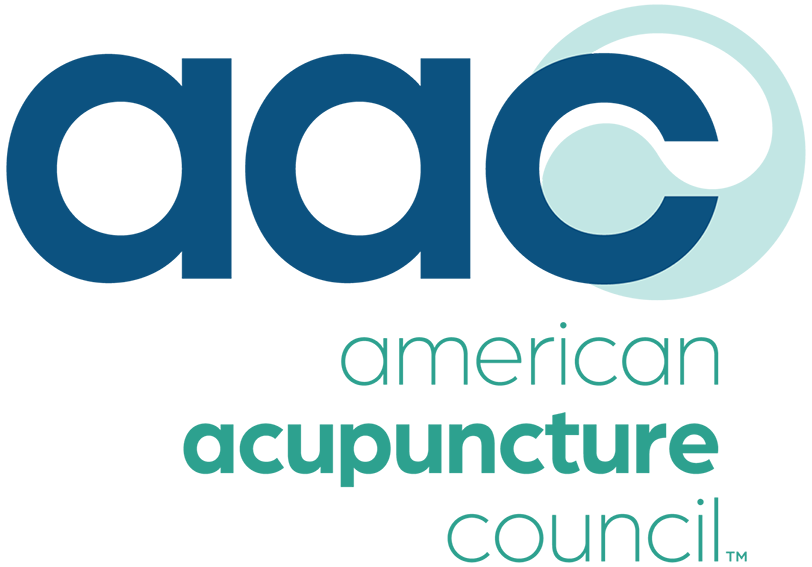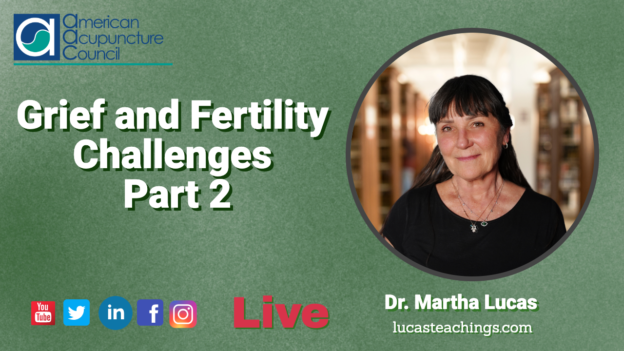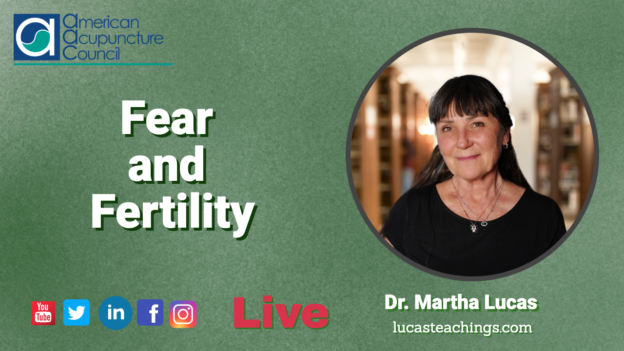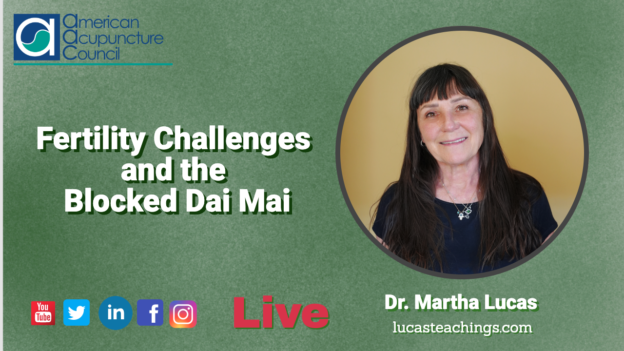Click here to download the transcript.
Disclaimer: The following is an actual transcript. We do our best to make sure the transcript is as accurate as possible, however, it may contain spelling or grammatical errors. Due to the unique language of acupuncture, there will be errors, so we suggest you watch the video while reading the transcript.
Hi, my name is Tsao-Lin Moy and I am a licensed acupuncturist, herbalist and massage therapy. With a brick and mortar office in Union Square in New York City. So I’d like to thank the American Acupuncture Council for sponsoring these events and presentations. And today I’m gonna be talking and sharing with you about the five top things to address when you’re working with fertility patients.
And so we’re going to go to the slides right now. Okay. . So these are the top five areas that we wanna address with our patients, especially when they’re struggling to conceive. Now I’ve been practicing for over 21 years, and I do have a very high success rate with treating patients, and this is because I always ha like address these areas aside from acupuncture and herbal formulations.
These are some key things that if you don’t address them, then you’re not gonna have the same success. Okay, and go the next slide. So you probably already know that fertility is, or infertility is a really big problem and it continues to grow, not only in the US but throughout the world. In most developing countries, at least 12% of the population is struggling with issues of infertility, and in particular in the us one in eight couples are experiencing infertility, and one third of them is also related to male issues, not just female issues.
Though what I do have to say is mostly you see female patients because they’re a little more proactive and they’re, they have hormonal fluctuations and stress really will affect their hormones. So the first and most important, which I find is mindset. Many of the patients that come to see me are super stressed out, and probably the same with you, that they’ve already gone through trying on their own getting frustrated, going to a fertility clinic.
And then being told that maybe they have low A m H, high F, SS, h that their cycles are all off, that they’re getting too old. And what that does is that creates a huge negative mindset. And so one of the issues is that, If the, your couples are already thinking that they’re not gonna be able to conceive, or they’re getting lots of information that is not good for them, like off the internet, then they’re gonna be approaching everything as a problem and it’s gonna be a lot harder for them to look for a solution.
So you might find that they come to you and say, oh, how can I fix my hormones? Or oh I don’t know, when I’m ovulating or I have polycystic ovary syndrome, which is something that’s, coming up as a polycystic ovary awareness month is coming up in September. . But what we do know is that research shows is that what you think really matters and having a positive outlook is gonna help to cope better with stressful situations, especially for couples that are trying to conceive.
And it also will reduce like negative health effects on the body. So what I would say is you have to listen to your patients really carefully about what they’re saying about their fertility and then . Keep an eye on that because if that is an ongoing theme with them and they’re focusing on that, then what happens is they’re not focusing on the bigger picture, which is overall health is gonna make a difference with fertility.
So what we look at is, and this is like the number one thing that I have my patients do not just only relating to fertility, but also to anything when someone has back pain and they’re like, oh, maybe I’m never gonna be able to go skiing, or, I’m ne maybe I’m not gonna be able to go running or play tennis anymore.
Those are . Worrisome. And so the focus is really, it’s not just only on the pain, it’s also gonna be on the stress that, what does that mean for an active life? A key thing which I would say is that many women’s self-worth is attached to their ability to getting pregnant. And they have these secret fears and limiting beliefs that are gonna leak into their thoughts, and that undermines their confidence. So even though they may be coming and doing all of those things that they actually might be working against themselves, right? So we’re creating this resistance or creating more internal stress.
So the beliefs and fears, they actually create an energetic, spiritual, and emotional block. And that actually affects the physical body. So what we’re offering them is an experience of themselves in a new way. So when they come for acupuncture, when they come and they get herbs and we speak to them Not so much in the Western medical, dialogue, but really talking about balancing their yin and yang increasing the blood flow, the flow of their tea improving sleep.
Those kinds of things are not the same language that will trigger them into worry. Okay. So this is one of the exercises that I give to my patients and it helps them to develop that fertility mindset. And it’s an exercise. So oftentimes, we don’t realize, and this applies to everything, that we speak negatively to ourselves, all a lot.
And that’s what causes a lot of that tension and stress. Can I do it? I can’t do it, or I’m not good enough. So what I have my patients do is think of two or three of these secret fears or limiting beliefs around conceiving a child or even being a parent. So things like I hear often, my eggs aren’t good, there must be something wrong.
It’s taking so long. I’m all alone or I’m too old. Instead, what they need to do is replace each one of these with something that’s gonna be empowering to them and help pull them forward. My eggs are in my body are strong. I’m completely functional and normal. I trust my partner will be a good parent.
My hormones are perfectly balanced and the time is now. So these are things to counter the negative beliefs. Oftentimes, you can’t stop ’em. What you can do is replace them. And another thing too is really that visualizing that it’s gonna happen. So oftentimes I have them create, I don’t have it in the slideshow, but create the a vision board really, whatever it is that you want.
Looking through a magazine, this beautiful car, this beautiful home, or what is that? That it’s really important that there is a positive image for them. So they keep moving in that direction versus looking at things or worrying about things that are, that haven’t happened and really aren’t true. So the second thing the second tip is to remove the causes of unnecessary strep.
Stress and to help your patients with the strategy. So one of the strategies is helping them with that mindset. This is also an exercise to encourage and support that. So one of the things that I would say is clear the cookies on your computer or your phone, all of the searches. Oftentimes, I’m sure you find that patients are searching their condition finding all of these like chat rooms that have problems and really the worst things that are there.
And then you get stuck in an algorithm that has a lot of clickbait and negative stories and tragedy, right? And so this is something that they need to stop doing. And really if they have a question to, to talk to you about it and you help them also, what I find is when my patients are going to fertility clinics that they’ll tend to filter for the negative stuff instead of the positive.
So they’ll . Tell me, oh, my doctor said I might have this, or this could be a problem. Or they’re testing for something and then they tend to focus on something that’s negative and not on what is actually positive. And then oftentimes in a medical office, there’s this kind of a, I don’t want to have, encourage too much positive expectations so you’re not disappointed.
So they like to manage disappointment which is . In my opinion, not their job, . And then the other thing is really what I call, French Way. If you’ve ever heard of that, people who are not helpful. Start to give you their opinion or talk about all the negative things. Oh, I know someone who had never happened and they spent, a hundred thousand dollars on I V F, or, then they had children, problem child or something like that.
And so these are really things that you teach your patients to create this container. For this thing that they want. And this not just applies with getting pregnant and having a family, but it also applies to everything else. If you wanna lose weight or get healthier, start to run a marathon.
Do things for your, develop a practice. It’s really you have to look at who are the people surrounding you and if your patients are coming to you. For help and assistance in this area, they’re already looking for something different, so we don’t wanna feed back to them the same kind of negativity and fears that they may have.
And a lot of that too is gonna have to do with, our dialogue. How do we talk to them? Do we use a lot of western dialogue or do we help to shift them into the language and metaphor of Chinese medicine? So the third tip that I suggest to my patients is to ditch those digital apps.
And those are because they cause a lot of stress. And the other thing, and then is to teach your patients how to monitor where their fertile window is, and using a low tech way to do it on paper. And the reason that I have my patients do it on paper is because the digital apps. Do they take into account like an average of a standard and really with, women individually, there might be variations in the cycle.
So oftentimes one of the problems that’ll show up is that my patients are saying like, oh, but my app says. That I should be ovulating at this time or that I should do this, or in some cases I’ve seen that an app will change their ovulation time, like go back and change the history of it to accommodate an algorithm.
And then what you have is someone trying to fit into . What a standard is, which is not necessarily for them, right? It’s like a general and we’re really looking individually. And so the other thing too is you might ask yourself, why would we use charts and thermometers and pee sticks when there are all these electronic monitors, right?
And fancy phone apps. And so here’s the thing. Electronics are a huge trigger for a stress response, and stress is one of the biggest barriers for conception, right? So this also relates to the previous exercises, like what else is, causing stress, which will disrupt hormones.
So no matter what, we know, we also need to address the diet. Now this can be a trigger for patients that might have eating disorders or previous eating disorders because it can trigger something. And also in our fast-paced, Daily life, we tend to have things delivered and it says it’s organic. But the other thing too is that all these organic drinks are in these plastic bottles.
And and also we’re trying to reduce sugar and artificial sweeteners are also become a problem with hormones and the microbiome. So cutting out processed foods, not only does it mean like fast food, I also consider things that are processed even though they’re quote unquote healthy.
So really the focus on whole and organic foods and really no alcohol is, not good for the immune system and also causes like a lot of other problems. So I don’t need to go into, for the and most . Patients are, especially the women are not drinking alcohol or even caffeine.
The thing is that their partner also needs to be like doing something as well. So a lot of the time the burden is on the female. Part of the couple and really both male and female need to participate. And even though it wasn’t in the other slide, that becomes a real issue when and I’m sure you see it, is the woman is focusing on her cycle, her chart, and when she’s fertile.
Totally stressing out. The partner may be like, whatever. And that creates a lot of distress because they’re not working on this together. So as much as you can include both of the couples or both, male and female or if it’s a, . Same sex couples in, in any way that you can have them participate as a couple, then it increases their support, especially at home, right?
’cause there’s only so much we can do. But really those are things to address. And in my practice I do ask like, how are things with your partner with it? Because when one partner gets super stressed out, That creates that can create a wedge in the relationship. And then we, I see that a lot, and sometimes the other partners, I don’t even recognize them.
They’re like so obsessed. They can become obsessed. So I put in with a star, an excellent prenatal vitamin. Now here’s the thing. A lot of patients that show up, they have done lots of research and I also find that they’re taking like way too many supplements. And this is gonna be something that’s more individual.
I would look at things that are gonna be basic in . For needs especially like B vitamins, some vitamin D like something like that. Some zinc definitely for men are gonna need to take something, some zinc, vitamin D, vitamin E, to improve the sperm. But also I just have a little star there because oftentimes, Taking lots of vitamins is equating to taking a pharmaceutical right?
Kind of not really looking oh, I don’t really need to eat well because I take vitamins. And really eating whole foods is also a practice, right? It’s something part of self-care, something you’re doing for yourself, something that you’re choosing every time instead of . Like robotically just, taking things.
And again, the partner needs to be taking supplements. It, I also added in here eliminating plastics as I mentioned. Like a lot of the drinks, even though they’re healthy, they’re in a lot of plastics and everything is in plastic. And also a lot of soaps and shampoos because those actually break down like cell membranes.
And they are hormonal disruptors. So those are our things to have your patient kind of Hey, maybe eliminate change some of these detergents and hand sanitizers. So the next is inflammation. So inflammation from . The chemicals were exposed to all around us. The pollutions the limp system is, something that helps to process metabolic waste and all hormones and nutrients and waste products actually go to and from the cells.
They pass through this intracellular matrix known as our lymph system, and we can’t remove. Toxins properly or hormonal imbalances and different kind of enzymes and stuff if our lymph system is not working properly. So all of the, that kind of inflammation and waste gets deposited in the tissues.
Now, if you’re working with patients that are undergoing fertility treatments and they’re taking a lot of hormones. One of the big complaints is that they start to gain weight around their middle. And so they get a lot of swelling, they get inflamed. And so really important is to have them do some lymphatic massage or you can show them some exercises, to move the lymph.
Exercise is one of the things that’ll help. But more like gentle exercise like yoga and tai chi, like all of those things that we prescribe our patients. But not just because it’s mindfulness, but really these are the movements that are gonna help to remove inflammation and metabolic waste and ultimately, that helps to balance the body.
And it’s also good to give them as an exercise so they’re being proactive. I. They’re on their fertility journey. I cannot emphasize more the importance of sleep. And this really ties back to what is the, our balance of yin and yang. And one of the things is like sleep deprivation is not only gonna interfere with your circadian rhythm, it’s the biological clock.
And that’s what actually . Tells the body when to release different hormones. Now, it’s not only important that you’re getting seven hours or uninterrupt like deep sleep. It’s also important that it’s at night, right? So we take advantage of the nighttime and that we’re producing enough. Melatonin, which is known as the hormone of darkness.
So that will actually then have restful sleep and have energy during the day. So studies actually show that. Sleep deprivation actually really affects men in a way. And it’s interesting because men are considered more young that it’ll affect their sperm production and really, and it’s important that they sleep at night in particular.
So there are studies around that. And really the sleep effects in relation to fertility because it is part of hormonal production, right? So this is something where we don’t have to prescribe hormones ’cause it’s not in our scope. To help to balance hormones and then also if your patients are undergoing fertility treatments to really not work against what they’re doing, right?
So you want your body to be in rhythm Alright, so just a review. I actually gave you six things mindset removing the stressors, ditching, digital addressing inflammation food and sleep. And that’s the end of the show.










